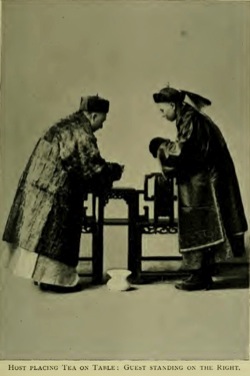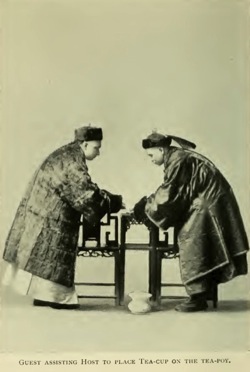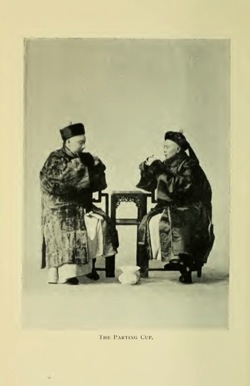|
FEATURES
Ways that are Dark: Taking Tea | China Heritage Quarterly
Ways that are Dark: Taking Tea
W. Gilbert Walshe, M.A.
Editorial Secretary of the Society for the Diffusion of Christian
and General Knowledge Among the Chinese etc.
The Society for the Diffusion of Christian and General Knowledge Among the Chinese was founded in Shanghai in 1887 by British and American Methodists to introduce both Christian and scientific concepts to China. To achieve these goals, members undertook a range of activities, including translation projects. Members of the Society included Young John Allen and Timothy Richard, both of whom had considerable impact on late-Qing reformists.
Ways that are Dark first appeared through Kelly and Walsh in Shanghai in 1890. Written to facilitate the propagation of the mission of the Society it went through eleven editions up to 1924. The title of the book is a reference to a line in the poem 'The Heathen Chinee', written by Bret Harte in 1870 and meant as a satire on anti-Chinese attitudes prevalent on the Californian goldfields at that time. Unfortunately, widely misinterpreted and highly popular the poem only served to entrench racist views. For the poem and these circumstances, see here.
By way of contrast, Walshe's book offers a not unsympathetic introduction to elite Chinese mores. As the author states, it was written 'at the request of the Mid-China Church Missionary Conference for the guidance of missionaries newly arrived in China, it being felt that a better acquaintance with Chinese social methods might prevent many unfortunate blunders and much mutual misunderstanding between the missionaries and the Chinese.' After referring to Harte's controversial poem, Walshe continues:
So far from attempting to deride or belittle the old-established and, in many cases, admirable institutions of the Chinese people, my special object is to solicit a more particular attention to the usages of Chinese polite society, and to bespeak a more sympathetic and appreciative recognition of their social conceptions than at present obtains in some—I might venture to say, in many quarters.[1]
Many of the formalities described in Ways that are Dark persist in various guises in contemporary behaviour—or at least they are widely recognized and appreciated when understood. Minor modifications including paragraph breaks and Hanyu Pinyin have been made to accommodate the modern reader.—The Editor
Comportment when Taking Tea

Fig.1 Host placing tea on table: Guest standing on the right
Before the company is actually seated the host places cups of tea on the tea-poy (茶几) at the side of each seat, the guest putting both hands to his head in acknowledgement; and when the servant places the cup for the host, the guest makes a feint of helping to put it down with both hands, and the host rises slightly from his seat with a gesture of remonstrance, saying: 'I am not worthy' (不敢). The tea is not drunk at once, but conversation begins.
The visitor, if acquainted with the host may say, 'I am come again to trouble you' (近日又来吵擾), the host replying, 'You are too polite' (客氣勞駕). If a new arrival is present, the older visitor may then say, 'Mr. So-and-so has lately arrived, and has come to pay his respects'; and the host replies, 'I am not worthy'. If there is any business to be discussed it may then be introduced, and some polite references may be made to the fact of His Honour's kind protection of the foreign resident in his district, etc. One or two general cautions may here be suggested with reference to the bearing of the foreign visitors:
1. It is very important that visitors should 'look pleasant', as the photographers say, and should smile affably, but not too effusively, when addressing the host or replying to his questions.
2. The voice should not be too loud, but gently modulated.
3. The wonders of foreign mechanical contrivances, and other achievements, should not be too blatantly advertised; and, in fact, they had better be kept in the background unless the subject is introduced by the host.
4. Criticism of Chinese methods, and especially 'little weaknesses' of the officials, should not be indulged in—this would be extremely 'bad form'.

Fig.2 Guest assisting host to place tea-cup on the tea-poy.
5. When the speaker refers to himself he should avoid, as far as possible, the personal pronoun, and should speak of himself as 'the brother' (兄弟). The second person should never be used in addressing the host, but he should be styled 'Your Excellency' (閣下), or, if of any rank above that of district magistrate, he may be called 'Great Man' (大人). In referring to China the visitor should call it 'Honourable Kingdom', and refer to his own country as 'Mean Kingdom' (貴國,敝國).
6. An official call should not be greatly prolonged, as the magistrate is (politely) supposed to be immersed in affairs of state, and an excuse for a short visit is easily supplied by remarking that His Honour is doubtless very much occupied, etc.
7. It is not polite to look the host 'right in the eye', but to fix the eyes upon his breast when addressing him, and only occasionally look him in the face—the appearance of excessive boldness is thus avoided.
8. In conversing with comparative strangers great care should be observed in order to avoid indiscretions; whilst in the company of familiar acquaintances even greater care is necessary, lest one should be led to speak inadvisedly; and it should be remembered that the hasty utterance, though harmless enough in the intention of the speaker, may be distorted beyond recognition when repeated by careless or designing hearers.
9. If it should happen that the host is acquainted with English, the conversation should be conducted in that language, and a good many of the ceremonial observances may be thus avoided.

Fig.3 The parting cup.
If the host thinks sufficient time has been occupied, he may say, 'Please take your tea when it suits you' (随便请茶). This is a signal to depart. Or if the guest is anxious to go, he may take the initiative and invite the host to drink, by saying, 'Please (take) tea' (請茶). If, however, the guest is invited to partake of tea before his business is satisfactorily arranged, he may overlook the hint for the nonce; but if the official should order the attendant to bring in fresh tea (换茶), this must be taken as a signal which cannot be disregarded, and the guest must either finish what he has to say without further circumlocution, or take his leave without delay.
In some cases, however, it will be evident that the host does not intend to hasten the guest, but merely to consult his convenience by replacing the tea which has grown cold; this will be evident when the host himself is engaged in a long speech, and gives the order for fresh tea before he has exhausted his topic. In such cases the guest's own perception will be the best guide, as no hard-and-fast rule can be laid down; but it will be well to remember that in ordinary cases the order for fresh tea is intended as a hint to bring the interview to a close.
When about to drink tea the guest take up his cup with both hands, and raising it to his lips at the same moment as his host, sips once or twice in concert with him, and puts down his cup when he does. When the guest has tasted his tea he should say, 'I have put you to trouble' (叨擾), or some other suitable phrase, and rise up to take his departure.
Host and guest salute each other with a gong [躬 'bow']—meanwhile the servant will have called the chair-bearers—and the host conducts his visitors through the several gateways to the place where their chairs are awaiting them, the guests going first and making a polite protest at each doorway against the host accompanying them any further, saying, 'Please stay your steps' (請留步), or, 'I am unworthy'; the host replying, 'This is only right' (應該), or, 'You are too polite.' On reaching the entrance, where the chairs are stationed, both host and guest make a gong, the visitor steps sideways over the pole of his chair (which is held down for the purpose by one of the bearers), taking care that he does not turn his back to his host in so doing; and just before taking his seat, he makes a final gong, saying, 'We shall meet again' (再會). He then backs into his chair and is borne off.
Source:
W. Gilbert Walshe, Ways that are Dark, Shanghai: Kelly and Walsh, 1890, pp.50-54.
Note:
[1] Walshe, Ways that are Dark, pp.11 & 12.
|